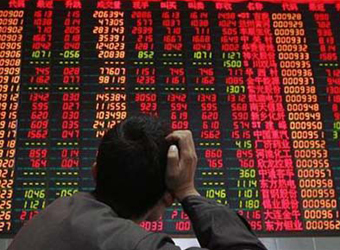Asian markets were under pressure on Tuesday, as investor sentiment soured after the Dow retreated further from the 20,000 mark and oil prices plunged as much as 4 percent overnight.
The ASX 200 fell 0.9 percent, seeing broad losses across all sub-indexes except for gold which was up 1.81 percent.
Australian retail prices for November rose by 0.2 percent from October, versus market consensus calling for a 0.4 percent increase.
Japanese benchmark Nikkei 225 slipped 0.19 percent, like due to the yen’s strength.
Shares of Toyota were up 0.27 percent to 6,949 yen each after initially trading lower. Its North American Chief Executive Jim Lentz announced on Monday that it would invest $10 billion over the next five years in the U.S. to meet demand and upgrade plants and build more fuel-efficient models.
The Japanese automaker has recently been criticized by President-elect Donald Trump on Twitter for shifting the production of its Corolla to Mexico from Canada.
But Toyota’s Lentz said in an interview at the Detroit auto show that this investment was not in response to Trumps’ latest tweet, but part of Toyota’s business strategy.
Takeda Pharmaceutical was up 1.35 percent to 5,032 yen a share, after it announced it would buy U.S. cancer drug maker Ariad Pharmaceuticals, in a deal valued at $5.2 billion.
Over in South Korea, the Kospi was down 0.14 percent.
South Korean electronic giants LG and Samsung consider building U.S. factories for the production of home appliances to appease Trump, the Nikkei Business Review reported late Monday. Both companies are set to announce its plans to invest in the U.S. ahead of the new president’s inauguration on Jan. 20.
LG Electronics was down 2.05 percent at 52,500 won each, while Samsung Electronics inched 0.05 percent at 1,863,000 won per share.
Mainland Chinese shares were under pressure, with the Shanghai composite down 0.19 percent and the Shenzhen composite off 0.065 percent.
China’s December consumer inflation was up 2.1 percent year-on-year, lower than a Reuters poll which had expected consumer prices to rise by 2.3 percent, while producer prices jumped 5.5 percent from the previous year compared to forecasts of 4.5 percent increase. Producer prices had risen to the fastest pace since September 2011.
Hong Kong’s Hang Seng was in the green, up 0.37 percent.
Stateside, the Dow Jones industrial average retreated from its march to 20,000, slipped 0.38 percent to 19,887.38, while the S&P 500 fell 0.35 percent to end at 2,268.9 while the Nasdaq composite finished up 0.19 percent, to 5,531.82.
In currency markets, the dollar index lost ground to trade at 101.87, compared to highs of 102.29 yesterday.
“Greenback bulls have erred on the side of caution this week as we approach Trump’s press conference and confirmation hearings,” said Matt Simpson, senior market analyst at ThinkMarkets, in a note released Tuesday.
The yen rose against the dollar at 115.98, while the Australian dollar was stronger at $0.735. The pound was weaker against the greenback, trading at $1.2137, extending a four-day decline after comments from British Prime Minister Theresa May suggesting that the U.K. may leave the European single market.
During Asian hours, U.S. crude were up 0.02 percent at $51.97 a barrel, while Brent was down 0.04 percent at $54.92.
Crude prices dropped 4 percent on Monday during U.S. hours, on concerns that record Iraqi crude exports and rising U.S. production would undermine the Organization of Petroleum Exporting Countries recent deal to cut supply.
In Iraq, oil exports from the southern Basra ports reached a record high of 3.51 million barrels per day in December, Reuters reported.
Source: CNBC


